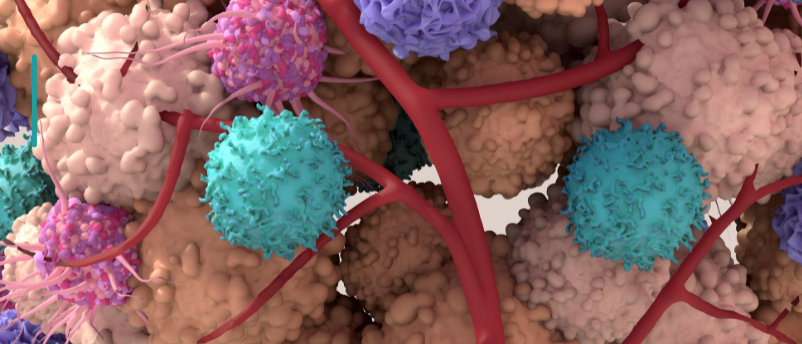Vascular multiomics to study tumor progression and metastasis

Breakthrough discoveries of the last decade show that vascular endothelial cells control their microenvironment in an instructive paracrine manner, called angiocrine signaling.
Applying recent advances in omics technology to generate single-cell transcriptomic profiles (scRNA-seq) enables the understanding of endothelial structural and functional heterogeneity (‘angiodiversity’) at unprecedented resolution.
A multiomic approach can provide high-resolution analysis of translational and post-translational processes.
In this presentation, Prof. Hellmut Augustin discusses the multiomic systems maps of vascular endothelium in the challenged liver and during metastasis as examples of the power of high-resolution multiomic approaches to advance translation-relevant discovery research.
What will you learn?
- The value of applying transcriptomics and proteomics for new insights into tumor progression and metastasis
- About the identification of LRG1, (Leucine-rich alpha-2-glycoprotein 1), as an early instructor of metastasis
- How multiomic analyses can be used to advance translation-relevant discovery research
Who will this interest?
- Cancer research labs
- Clinical research organizations and pharmaceutical companies
Speakers

Prof. Dr. Hellmut Augustin
Professor and Director
Medical Faculty Mannheim & German Cancer Research Center (DKFZ), Heidelberg
European Center for Angioscience (ECAS), Heidelberg University
Hellmut G. Augustin is Professor of Vascular Biology at the Medical Faculty Mannheim of Heidelberg University, Head of the Division for Vascular Oncology and Metastasis Research at the German Cancer Research Center (DKFZ), and Founding Director of the European Center of Angioscience at Heidelberg University, Germany. Trained as a Veterinary Pathologist (Hannover, Germany) and with a PhD in Experimental Pathology (Cornell University, USA), he worked previously as Assistant Professor at the University of Göttingen, Germany and as Department Head at the Tumor Biology Center in Freiburg, Germany.
His research interests include:
1) mechanisms and functional consequences of endothelial cell (EC) and pericyte angiodiversity in different vascular beds
2) tumor endothelial interactions at the pre-metastatic and metastatic niche
3) epigenetic changes of endothelial cells in pre-metastatic and metastatic niche and
4) translational tumor angiogenesis experiments aimed at defining the therapeutic window of anti-angiogenic tumor therapies.

Anna Babayan, PhD
Senior Marketing Manager, Cancer Research
Medical Faculty Mannheim & German Cancer Research Center (DKFZ), Heidelberg
European Center for Angioscience (ECAS), Heidelberg University
Anna Babayan, PhD is the senior cancer research marketing manager at Illumina. Her aim is to enable researchers to use established and emerging NGS applications to bring cancer research to the next level.
Before joining Illumina, Anna worked as R&D scientist at QIAGEN. She has a PhD from the University of Hamburg, Germany and worked as a PostDoc at the Institute of Tumor Biology at University Medical Center Hamburg-Eppendorf. She focused on translational cancer research and liquid biopsy. Anna was involved in the IMI consortium Cancer-ID and has authored >10 peer-reviewed journal articles and a chapter in World Cancer Report 2020.
This webinar was recorded on Wednesday 29th March 2022